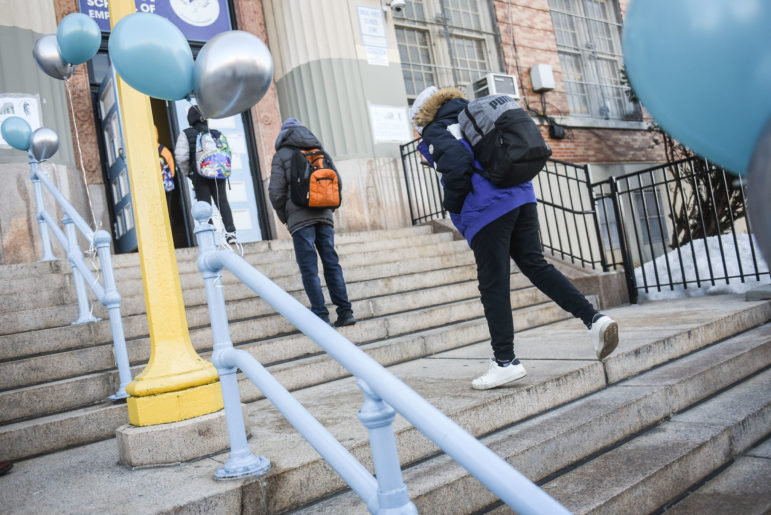
Photo by: Marc Fader
The building on 178th Street in the Bronx where six firefighters were forced to leap from a fourth-floor window. Two died. Prosecutors unsuccessfully charged tenants and owners for illegally partitioning the apartment in which the men became trapped.
This is a sidebar in a multipart story. Click here to see the rest of the series.
Despite the well-documented state of neglect at 3569 DeKalb Avenue, no one has ever been held accountable for the blaze that killed Jashawn Parker and badly burned his teenage brother. A civil case has dragged on. And it appears questions of criminal liability were never seriously considered. According to a spokesman for Bronx District Attorney Robert Johnson, the fire was deemed an electrical accident and was never referred to the DA’s office for prosecution.
Landlords who violate housing and health codes can get slapped with fines. They can even get brief stints behind bars for civil contempt if they don’t comply with mandated repair orders, as was the case with landlord Sam Suzuki, who spent 23 days in jail this summer for failing to address hundreds of violations at a building in the Bronx. But rarely do property owners face criminal charges, no matter how brazen the neglect might be. Convicting a landlord on the criminal level is a much harder task, legal experts say.
“It’s just not a winning thing for a district attorney,” says Ralph Stein, a Pace University Law School professor with an expertise in criminal procedure.
Under the law, Stein says, ordinary negligence—or a person’s failure to exercise a reasonable amount of care—falls under the realm of civil liability, not criminal. To hold defendants criminally liable, an attorney has to prove their actions demonstrated gross negligence or recklessness.
“Gross negligence is sometimes described as almost wanton and willful,” Stein says. “It’s just not something district attorneys feel confident about. Simply because a building is not maintained is not enough.”
In at least five cases involving the deaths of New York City firefighters, however, prosecutors have sought criminal convictions against squatters, landlords, tenants, engineers and contractors.
In 2001 a homeless man named Edwin Smith was sentenced to 15 years after pleading guilty to manslaughter charges for accidentally starting a fire in a building where he was squatting in Jamaica, Queens. Smith had lit a makeshift candle for warmth, and prosecutors argued that his failure to tell firefighters who arrived on the scene that the burning building was empty was a conscious decision—and reckless enough to constitute murder. Lt. John M. Clancy, 35, was killed when a floor collapsed beneath him.
In another 2001 case, a laborer named Patrick E. Jeffers got a 15-year sentence for starting an accidental fire in a Brooklyn garage where a firefighter, Louis Valentino, was killed. Jeffers was convicted of second-degree felony murder, or causing a death while committing another crime (namely, using a power tool to illegally transfer a vehicle ID number from one car to another) but he was acquitted of a second murder charge that accused him of “depraved indifference” for operating a grinding tool near gasoline, the action that started the blaze.
At the 2005 Black Sunday fire in the Bronx, Lt. Curtis Meyran and Firefighter John Bellew, trapped in a building that had been illegally subdivided, jumped to their deaths from a fourth-floor window; four other firefighters also jumped and were gravely injured. Prosecutors brought manslaughter and negligent-homicide charges against two tenants who installed the illegal partitions, but a jury acquitted them in 2009. Later that year, in a separate case, a jury found the building’s owner and a former landlord guilty of criminally negligent homicide. The men’s convictions, however, were eventually overturned by a judge who ruled there was not enough evidence to prove the two defendants knew about the illegal partitions inside the building.
In August 2006, Lt. Howard Carpluk and Firefighter Michael Reilly died when a floor collapsed at a Walton Avenue 99-cent store where they were battling a blaze. Prosecutors went after an engineer who had signed off on inspection reports that erroneously indicated that steel supports were in place in the building. The defendant died before the case concluded.
Most infamous was the 2007 fire at the Deutsche Bank building, where two firefighters died in part because the system for bringing firefighting water into the building had been crippled by demolition workers who severed a crucial pipe. The Manhattan DA prosecuted a corporation and three supervisors; all were acquitted.
Lighting a candle or cutting a standpipe are more overt acts than ignoring housing code violations. But the dangers posed could be the same, even if prosecutors’ response has been different, says Dina Levy, director of organizing and policy at the Urban Homesteading Assistance Board.
“There should be more criminal consequences,” she says. “I think if it were something more standard, it would actually have an impact on the quality of the housing stock.”
Had prosecutors attempted to seek indictments in the DeKalb Avenue fire, they would most likely have run into similar issues as those that cropped up in the Black Sunday and Deutsche Bank cases, Stein says.
“You would have to prove beyond a reasonable doubt that the wiring was the violation, that [the landlord] had ample opportunity to fix the wiring,” he says. “If the landlord has a good defense lawyer, it can become an expensive proposition.”
Andrew Laskin, a trial attorney who specializes in representing people injured on properties that lack adequate security systems, says the factors that drive prosecutors to seek indictments are complex and often political. He notes that the Deutsche Bank case “was a high-profile thing.”
Indeed, the fire at 3569 DeKalb Avenue and the conditions that led to it were barely covered by the citywide media. A search of the Nexis news archive found 453 articles mentioning Meyran and more than 70 about Valentino’s passing. There were four articles about Jashawn Parker’s demise.








